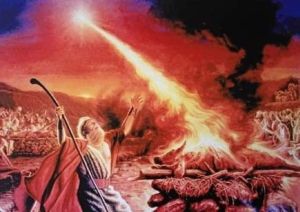Reading how God uses weather to serve purposes for the greater good is fascinating. Today, we will look at the Israelites wandering in the desert.
A Pillar of Cloud.
By day the Lord went ahead of them in a pillar of cloud to guide them on their way and by night in a pillar of fire to give them light, so that they could travel by day or night.
Exodus 13:21
God’s Navigational System.
After the 10 plagues in Egypt, the Israelites began their 40-year trek in the wilderness. At first, they were afraid. They didn’t know where to go. They cried out to God. God sent a cloud by day and fire by night to lead them. Of course, they thought it would take less than forty years. They probably thought it would take only a few months. Can you imagine traveling as a “people” with thousands of mothers, fathers, sisters, and brothers?
The Building of a Leader.
At first, Moses did not think he was capable of leading anyone. He told God that he was slow in speech and tongue. (Exodus 4:10) God wanted to use Moses because of Moses’ humility and willingness to follow God’s direction. God rarely uses the eloquent, strong person to accomplish his mission. He chooses the most unlikely people who turn around and become strong, vibrant leaders.
A Resilient People.

fine art storehouse dot com
Moses spent years honing his leadership skills in managing this great exodus. He learned patience, delegation, and conflict management. His vision and direction created a resilient people. After Moses passed away, God called Joshua to bring the Israelites to Caanan.
Lessons Learned
#1. Strength Comes from Unity and Community.
#2. Wisdom and Inspiration can be found in Family Connections.
#3. Obstacles Prepare Us for Our Life Journey.
Together is Better
In a world where we may feel alone, we can find others who identify with us and can help us overcome challenges. We can achieve goals by leaning on each other for encouragement and support. Can you think of a time when you were discouraged and wanted to quit, yet a friend or loved one encouraged you to continue? What was the outcome?
Gene Pool
Do you have a hankering for salt air? Or you like the cold when it nips your nose. The geographical location of your family of origin might shed some light on some of these quirky feelings you have had all your life.
Family stories provide us with a rich history of what our ancestor’s life journeys may have been like. These stories teach us values. And values can be strengthened by a greater sense of identity and connection to your heritage. Were your family members born during a time of conflict? A time of peace? Did they travel to another place? Was there a failed business? A successful business? Did any of your family members possess a specific talent or skill?
Twists and Turns.
Life is full of unexpected twists and turns. Many of which require hard work. Completing a high school education, college degree, or a trade certification. Or saving for a down payment on a home. What lessons can we learn from the path that leads to our “promised land?”
Maybe the next time you think something is taking “forever” – think again! Let us remember the story of Moses and the wandering Israelites. How steadfast a people continue to flourish despite all odds.
Track down your family tree.
Explore birthplaces.
Be thankful for family.
Take a Deep Breath.
Let’s breathe in wisdom and inspiration and exhale disbelief and pride.
If you liked this topic, please like, because it does matter.
A follow and a comment is great for analytics too!
(This is my “call to action” I’m supposed to include in every post and often forget.)


